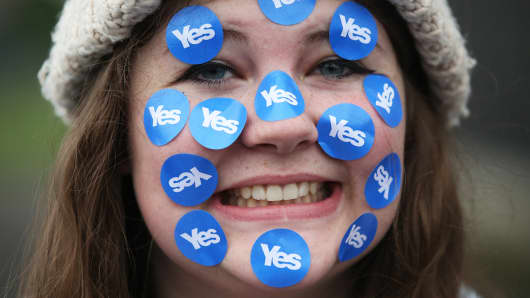As we now know, all this worry was unnecessary. The Scots weighed up their options and chose the devil they know rather than the devil they don't. Should those who wanted the UK to remain intact, breathe a sigh of relief that a near thing has been avoided? I would say no — for this was never a close run race and any relief would be misplaced and unnecessary.
Read MoreWhere money went as investors waited for the vote
As the polls were oscillating with the ferocity of a bagpiper's elbow, elsewhere we had data that would give succour to the most nervous of Unionists. The many spread-betting markets facilitating people to place bets on the outcome of the vote were a beacon of calm and consistency to the relative storm of public opinion.
The markets were consistent from one to another whereas public opinion polls yielded starkly different outcomes and, remarkably, the markets were consistent over time. Even as polls narrowed, the price of independence stayed extremely consistent in the world of spread-betting. Polls give us the emotional pulse of the voter but the financial markets give us their expectations, and indeed the expectations of non-voters too. On the morning of the vote, you could place a bet on Scottish independence at pretty much the same price, or odds, as a year previously.
Read MoreGreat Scot! Scotland's surprising inventions
Financial markets of this kind, where people can trade on their expectations of political outcomes with their own money, have been shown to be more reliable predictors than polls. The Scottish vote is just the latest example. Whether it is the outcome of the U.S. presidential election or the Eurovision Song Contest that is stressing you out, seek comfort, or at least the most accurate information available to you, in the spread-betting markets.
So, it's onwards with the EU project. And one cloud on the horizon is the current UK prime minister's promise to hold a referendum on the UK's membership of the EU, if he is prime minister after the next general election.
Read MoreAfter Scotland, watch out for these breakaway regions
Currently, spread-betting markets think UK voters would reject such a referendum, if they get the chance. But the price put on UK independence of the EU reveals speculators think it is much more likely than they did Scottish independence of the UK. The Europhiles among you should not fret too much, yet. Our spread-betters believe, although again marginally, Mr. Cameron will be doing something else than being prime minister after the next general election.
Commentary by John Walsh, professor of marketing at IMD. He also directs Building on Talent (BOT), a program for high-potential managers early in their career looking to take on greater responsibility.


